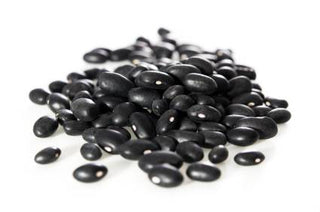(Phaselous vulgaris)
Black beans are about the size of a pea with a black skin, a creamy white flesh and a sweet, rich flavor often compared to that of mushrooms. They have a velvety-texture that holds its shape during cooking.
Black beans are also known as turtle beans (in reference to their shiny-like appearance), French beans, black kidney beans, black Mexican beans and Mexican beans.
Black beans are legumes which are plants with seed pods that split into two halves. Some of the more common legumes are beans, lentils, peanuts, peas and soybeans. The legume family also includes alfalfa, clover and even the beautiful flowering plant wisteria.
Like all legumes, black beans benefit from bacteria (rhizobia) that live in nodules along their roots. These bacteria draw nitrogen from the soil and affix it into a form that the plant uses as a nutrient. The nitrogen fixation ability of legumes allows these plants to be used in crop rotation to replenish the soil depleted of nitrogen. It also increases the protein content of legumes in comparison to non-legume vegetables.
Nutrition Facts
Black beans are an excellent source of high-quality protein and dietary fiber making them both filling and nutritious. Black beans are also full of essential vitamins and minerals.
One cup of cooked black beans has 227 calories; the majority coming from carbohydrates. Of these carbs, one-third is from fiber with a serving providing 15 grams of dietary fiber or 60% of daily values.
Like other legumes, black beans are an excellent source of protein, with a serving providing 15 grams. The protein is an incomplete protein source (does not contain all 9 of the essential amino acids) but can be made complete by adding a grain product such as rice to a meal.
Unlike animal protein, the vegetable protein found in kidney beans is low in calories and virtually fat-free. The amount of protein and fiber is equivalent to a 2-ounce serving of meat like chicken or salmon.
In their natural state, this legume contains virtually no sodium. But, a cup of black beans is loaded with sodium (typically well over 400 mg per serving). Rinsing the beans in a strainer before using will remove most of the sodium. Brands like S&W offer many of their canned beans with 50% less sodium or around 180 mg per serving.
Black beans are an excellent source of folate and thiamin, providing 64% and 28% of daily values. These beans also provide small amounts of other B-vitamins including riboflavin, niacin, vitamin B6 and pantothenic acid.
Like other beans, black beans are an excellent source of many minerals. A serving provides 38% of daily values for manganese and 30% for magnesium. Black beans are also a very good source of iron, potassium and copper, providing around 20% of daily values. These legumes also provide a good source of copper and zinc.
Health Benefits
Due to their high fiber content, black beans can help lower your cholesterol. One cup of black beans provides over 4 grams of soluble fiber.
The fiber in beans also prevents blood sugar levels from rising too rapidly after a meal. Black beans provide steady, slow-burning energy which is especially important for people with diabetes.
Black beans have a high proportion of fiber that is indigestible. This fiber is used as food for beneficial bacteria that produce butyric acid as a product of fermentation. This helps to keep the digestive tract functioning properly and may lower your risk of developing colon cancer.
The skin of the black bean contains high levels of phytonutrients which have anti-inflammatory and antioxidant benefits.
Selection & Storage
Black beans are available year-round and can be purchased dried or canned.
Like other beans, black beans are found in grocery stores in the dry foods or the canned foods section. From a convenience standpoint, purchasing canned beans is much simpler. And, the nutritional value differs little between canned beans and those you cook yourself. However, when purchasing canned beans, pay attention to the label and look for the sodium content. If you can’t find a low-sodium version, be sure to rinse the beans in a colander before using. Some good brands to try are Eden Foods and S&W.
Once opened, always store canned kidney beans in the refrigerator in an air tight container. They will stay fresh for three days when stored in this manner.
Recipes
Black beans have been a protein-rich staple food of many Latin cultures for generations. Today, black beans are enjoyed all around the world and are known as an easy addition to a meal.
For a quick lunch or dinner meal you can cook black beans with rice. Add black beans to your favorite chili, soup or stew recipe. Or, make soup using black beans and other vegetables.
For a tasty dip you can whip up in minutes and impress your guests, just layer black beans, corn, bell peppers, chopped tomatoes, onions, guacamole and cilantro in a dish and serve. You can also find a wide variety of recipe ideas on S&W’s website.
Want to slim down your brownie mix? Just add black beans to a traditional or box recipe and you’ll cut down the calories and fat! The taste and texture remain the same but the nutritional value goes way up.
Fun Fact
Moros y Cristianos or Moors and Christians is a black bean and white rice dish. The dish is said to have originated during the Moors’ invasion of Spain. Black beans represent the dark-skinned Moors and the white rice represents the lighter-skinned Christians.

